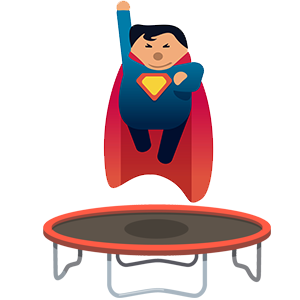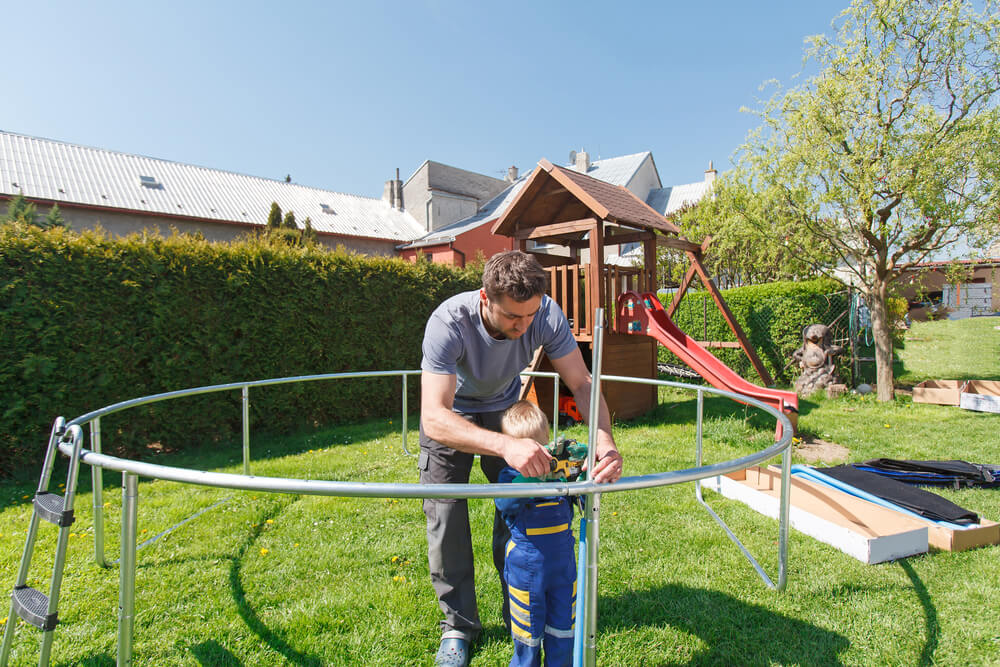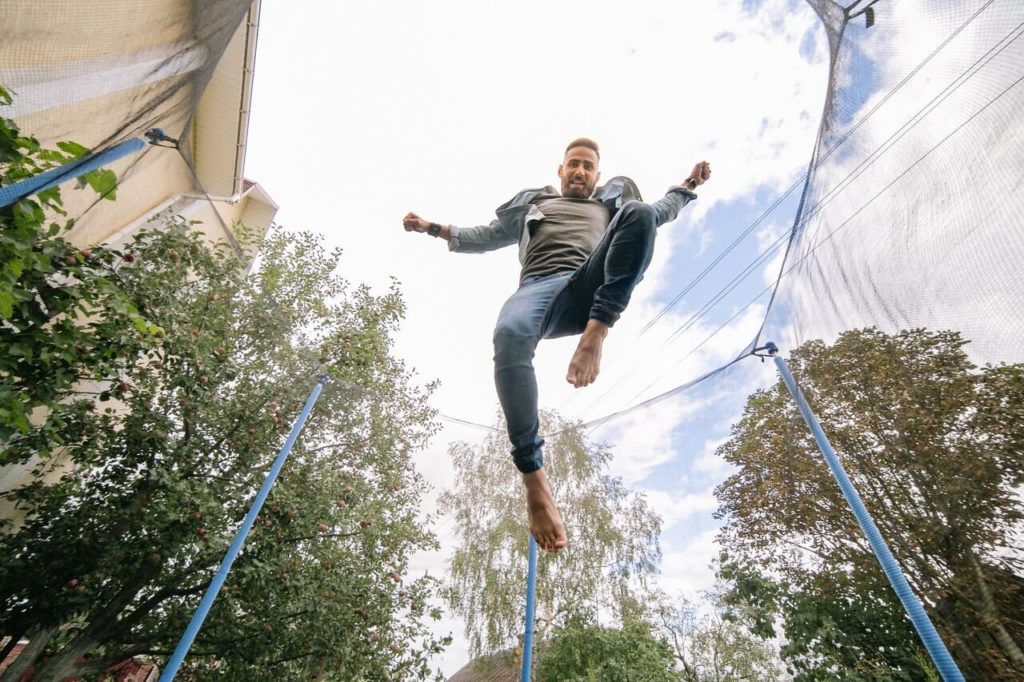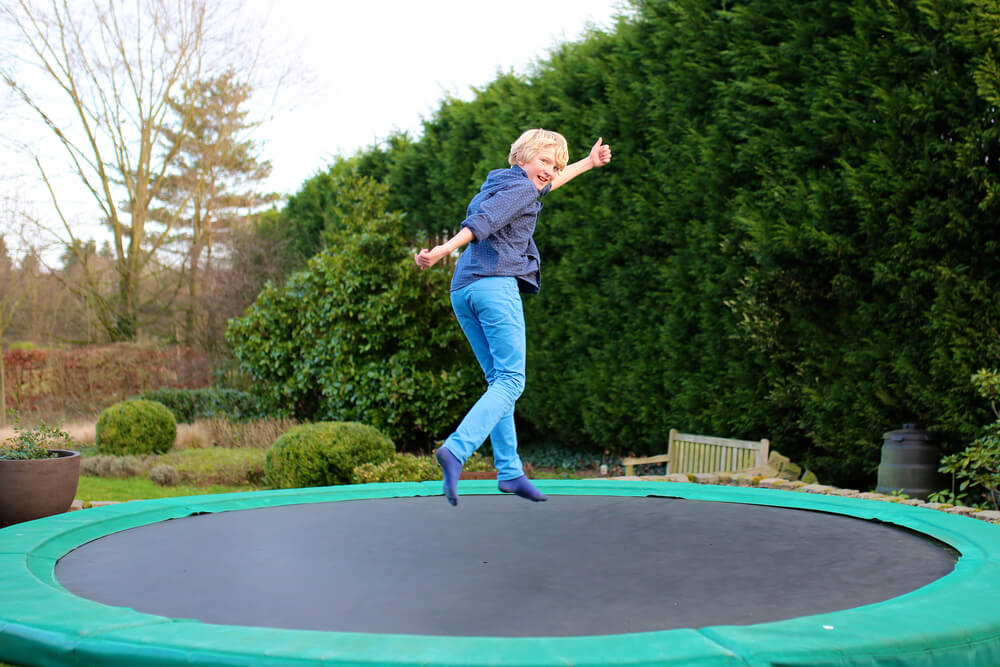Today, we are going to jump (hehe) into a subject that is seldom discussed but extremely important – Can you jump on a trampoline while pregnant?
Pregnancy is a beautiful journey full of do’s and don’ts, and with the rising popularity of trampolining as a form of exercise, it’s no surprise that many expectant mothers are wondering if it’s safe to partake in this fun activity.
In this blog post, we will explore the potential risks and benefits of trampoline jumping during pregnancy, expert opinions, safe practices, and alternative exercises that are considered safe during this special period. Our goal is to provide you, lovely mom-to-be, with a comprehensive guide and helpful tips to make informed decisions about your exercise routine during pregnancy.
But before we jump (pun intended!) into the details, let’s take a moment to acknowledge the importance of staying active during pregnancy. Regular exercise is crucial for maintaining physical and mental well-being, and it can also help prepare your body for childbirth. However, it’s equally important to ensure that the activities you engage in are safe for both you and your baby.
So, let’s bounce into it and find out if trampolining while pregnant is a yay or a nay!
Key Takeaways:
- Regular exercise during pregnancy is important for both physical and mental well-being.
- It is crucial to ensure that the activities you engage in are safe for both you and your baby.
- This post will provide a comprehensive guide on the safety of trampoline jumping during pregnancy, expert opinions, safe practices, and alternative exercises.
Make sure to stay tuned till the end, as we will also include an FAQ section to address common questions. Remember, while we strive to provide the most accurate and up-to-date information, it is always best to consult your healthcare professional before making any changes to your exercise routine.
Importance of Exercise during Pregnancy
Maintaining an active lifestyle during pregnancy has numerous benefits for both the mom-to-be and the baby. Regular physical activity can help manage weight gain, improve mood, increase energy levels, and reduce pregnancy-related discomforts such as backaches and insomnia. Additionally, staying active can also help prepare your body for labor and facilitate a quicker recovery post-birth.
Physical Benefits
- Improved Cardiovascular Fitness: Regular exercise helps to improve circulation and reduces the risk of developing pregnancy-related hypertension and gestational diabetes.
- Better Posture and Reduced Backaches: Engaging in activities that strengthen your core and back muscles can help improve posture and alleviate back pain, a common complaint during pregnancy.
- Enhanced Muscle Tone and Strength: Exercise helps to tone and strengthen muscles, which can be beneficial in coping with the changes that pregnancy brings to your body.
Mental Health Benefits
- Reduced Stress and Anxiety: Exercise releases endorphins, the ‘feel-good’ hormones, which can help to reduce stress and anxiety levels.
- Improved Sleep: Regular physical activity can help regulate sleep patterns and improve the quality of sleep.
- Boosted Mood: Exercise is a natural mood lifter and can help combat feelings of depression and fatigue that are often experienced during pregnancy.
Common Exercises during Pregnancy
While exercise is undoubtedly beneficial during pregnancy, it is important to choose activities that are safe and appropriate for your current fitness level and stage of pregnancy. Some common exercises that are generally considered safe during pregnancy include swimming, walking, stationary cycling, and prenatal yoga.
However, trampoline jumping has also gained popularity as a fun and effective way to stay fit. It provides a low-impact workout that is easy on the joints while still offering a good cardiovascular workout. But is it safe for expectant mothers?
Risks Associated with Trampoline Jumping
Trampoline jumping can be a fun and exhilarating way to stay active, but it does come with its own set of risks, especially for pregnant women.
Risk of Falling The most obvious risk associated with trampoline jumping is the risk of falling. Even if you have been jumping on a trampoline for years, pregnancy can affect your balance and coordination, increasing the risk of falls.
Risk of Jarring Movements Trampoline jumping involves repetitive bouncing movements, which can lead to jarring of the body. During pregnancy, the ligaments and joints are more relaxed and flexible, making them more susceptible to injury from jarring movements.
Comparison with Other Exercises Compared to other low-impact exercises like swimming or walking, trampoline jumping poses a higher risk due to the potential for falls and jarring movements.
Expert Opinions
Healthcare professionals generally advise against activities that carry a risk of falling or involve jarring movements during pregnancy. According to BabyMed, trampolining is not recommended during pregnancy as it can increase the risk of injury to both the mother and the baby.
“While it may be tempting to jump on a trampoline during pregnancy, it is best to err on the side of caution and avoid activities that carry a risk of falling or involve jarring movements,” says Dr. Amos Grunebaum, an OB/GYN and a Professor of Obstetrics and Gynecology.
Guidelines for Trampoline Jumping during Pregnancy
If you still wish to engage in trampoline jumping during pregnancy, it is crucial to follow some guidelines to minimize the risks.
Considerations Before Starting
- Consult your healthcare professional before starting any new exercise routine during pregnancy, including trampoline jumping.
- Assess your current fitness level and any pregnancy-related discomforts or complications that may affect your ability to exercise.
Safe Practices for Trampoline Jumping
- Use proper equipment: Ensure that the trampoline is in good condition and has safety features such as a safety net and padding on the springs.
- Use appropriate techniques: Avoid high jumps, flips, and other advanced techniques that increase the risk of falls and jarring movements.
- Listen to your body: Stop immediately if you feel any discomfort, dizziness, or pain while jumping.
Alternatives to Trampoline Jumping
Given the risks associated with trampoline jumping during pregnancy, it may be wise to consider alternative exercises that offer similar benefits but with less risk. Here are some safer alternatives:
- Swimming: This is a low-impact exercise that provides a full-body workout while being gentle on the joints and ligaments.
- Walking: A simple yet effective way to stay active during pregnancy. It can be easily adapted to your fitness level and can be done anywhere.
- Stationary Cycling: A great way to get a cardiovascular workout without the risk of falling or jarring movements.
- Prenatal Yoga: This can help improve flexibility, strength, and relaxation while being gentle on the body.
Case Studies
Case Study 1: Sarah’s Experience Sarah, a 30-year-old expectant mother, decided to continue trampoline jumping during her first trimester, as it was a regular part of her pre-pregnancy fitness routine. However, she consulted her healthcare professional before continuing and made modifications to her routine, such as avoiding high jumps and flips. Despite taking precautions, Sarah experienced mild spotting after a trampoline session and decided to stop trampoline jumping for the remainder of her pregnancy. Instead, she switched to swimming and walking, which she found to be more comfortable and less stressful.
Case Study 2: Emily’s Experience Emily, a 28-year-old expectant mother, decided to avoid trampoline jumping altogether during her pregnancy. She had read about the potential risks associated with trampoline jumping during pregnancy and did not want to take any chances. Instead, Emily opted for prenatal yoga and stationary cycling, which she found to be enjoyable and beneficial for her physical and mental well-being.
Tips for Staying Safe
While exercising during pregnancy, it is important to follow some general tips to stay safe:
- Consult your healthcare professional before starting any new exercise routine.
- Listen to your body and stop immediately if you feel any discomfort, dizziness, or pain.
- Stay hydrated and avoid exercising in hot and humid conditions.
- Wear comfortable clothing and supportive shoes.
- Warm-up and cool down properly before and after exercising.
- Avoid high-impact activities that carry a risk of falling or involve jarring movements.
Conclusion
Exercise during pregnancy is crucial for maintaining physical and mental well-being. However, it is important to choose activities that are safe and appropriate for your current fitness level and stage of pregnancy. While trampoline jumping can be a fun and effective way to stay fit, it carries risks that may outweigh the benefits for pregnant women. It is always best to consult your healthcare professional before starting any new exercise routine during pregnancy and to consider safer alternatives like swimming, walking, stationary cycling, or prenatal yoga.
Remember, the most important thing is to stay active and healthy during your pregnancy, so find activities that you enjoy and that are safe for both you and your baby.
FAQ
Q: Is it safe to jump on a trampoline while pregnant? A: Healthcare professionals generally advise against activities that carry a risk of falling or involve jarring movements during pregnancy. Trampoline jumping involves both of these risks and hence, it is not recommended during pregnancy.
Q: What are some safe alternatives to trampoline jumping during pregnancy? A: Some safer alternatives to trampoline jumping during pregnancy include swimming, walking, stationary cycling, and prenatal yoga. These activities offer similar benefits but with less risk.
Q: Can trampoline jumping cause miscarriage? A: There is no direct evidence to suggest that trampoline jumping can cause miscarriage. However, activities that carry a risk of falling or involve jarring movements are generally not recommended during pregnancy, as they can increase the risk of injury to both the mother and the baby.







